9 Essential Content Writing Tools For SEO
Any search engine optimization (SEO) enthusiast knows how dynamic modern SEO is. Not only does it change with every advancement in digital technology, but it also requires mastering new SEO content writing tools and software.
It’s a speeding train you cannot leave. Once you stop learning new tools, someone else will do that for you and leave you far behind. Not because they are more competent and smarter than you, but because their skills get enhanced by the perks of the latest technologies.

As an SEO specialist, you must constantly stay on your toes to remain well-versed with the latest SEO writing tools and software. That brings us straight to the purpose of this article — to provide you with an in-depth overview of the nine most essential SEO tools for content creation in 2025.
To help you grasp this complex topic, we’ll break the contents into three chapters:
- Tools for SEO research;
- SEO content writing software (based on AI-driven LLMs);
- General-purpose tools for SEO content writing.
Contents
Tools for SEO Content Writing Research
Did you know? Studies show that 68% of all online experiences begin with a search engine, and over 53% of website traffic comes from organic search.
This explains why you should take SEO seriously and never neglect the initial research stage. SEO research ensures your written content is relevant for the readers and ranks high in the search engine results.
Tools that empower your SEO content research efforts do just that — they let you craft optimized, high-quality content that will bring organic traffic to your pages. Among other things, SEO research tools enable you to do the following quickly and efficiently:
- Keywords research;
- Competitors analysis;
- Topic discovery;
- Performance tracking;
- Backlink optimization.
Moreover, a good content research tool for SEO empowers you to understand your audience better and develop a solid content strategy, which later serves as the foundation for all your content creation.
Pro Tip: Always keep several research tools in your SEO arsenal. Using at least a couple of them for a given task will make your SEO research holistic, and you won’t miss anything important.
Remember, no matter how good a tool is, it’s never a fit-all solution. There will be others that might work slightly better in particular situations.
Ahrefs
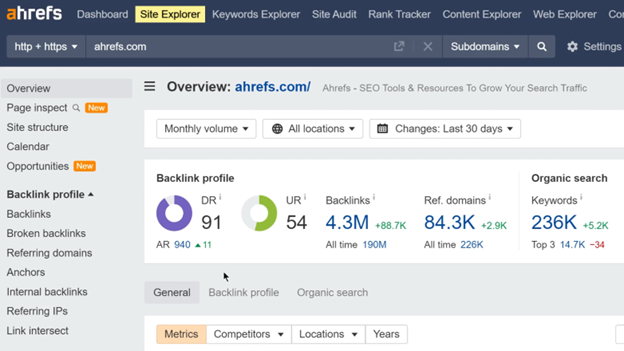
Source: Ahrefs.com
Ahrefs is one of the best tools for researching backlinks to a website. It allows you to quickly analyze the complete link profile of a competitor from A to Z.
In recent years, developers have continuously expanded Ahrefs capabilities, turning it from a highly specialized backlink-building tool into a service for comprehensive SEO analytics. Today, Ahrefs’s functionality includes:
- Comprehensive research of backlinks to a domain;
- Tracking the dynamics of changes in the link mass;
- Analysis and selection of search queries;
- Content analytics (e.g., the most visited pages in social networks);
- Displaying website ads in AdWords;
- Comparison of up to five competitor websites by various parameters.
This is not a complete list of options available to paid plan users. However, as an SEO writing tool, Ahrefs’s minimum pricing plan with most of the above-mentioned features starts at $129 monthly. Beginners can enjoy some basic functions (e.g., Site Explorer and Site Audit) free of charge.
Pros:
- Powerful keywords research functionality;
- Industry-leading competitor and content analytics;
- User-friendly interface;
- Broad reach and extensive database for general and local SEO;
- Regular updates.
Cons:
- High cost (from $129 to $1499 for advanced features);
- A steep learning curve for beginners;
- Lack of AI-powered content suggestions;
- Limited-usability free plan.
Despite the high price, the tool is undoubtedly one of the best for comprehensive content writing research and intelligence.
SEMrush

Source: Semrush.com
A powerful competitor analysis tool for SEO enthusiasts. The go-to functionality of SEMrush is to detect keywords by which competitor websites are shown in search results and contextual advertising.
SEMrush is also highly effective for researching backlinks, and for in-depth domain analytics in general. Both features are highly valued among all SEO tools for content writing.
With SEMrush, SEO specialists can compare several competitor domains, effectively visualize the results, search for hot queries, and track numerous SEO KPIs. For keyword research, a wide range of metrics can be displayed for each key, including assessing potential traffic, level of competition, and others.
What a misfortune that the tool heavily prioritizes paid service plans! Only paid plans pack the most valuable features for SEO research, and their pricing starts at $139.95 monthly.
A free plan is also available; however, its functionality is extremely limited (a max of 10 requests to analytics, one project to manage, and tracking 10 keywords per day only).
Pros:
- Detailed keyword insights, including difficulty, volume, and SERP features;
- Deep analysis of competitor content strategies;
- Excellent at own content strategy gap analysis;
- Offers built-in tools for topic research and content auditing;
- Intuitive interface.
Cons:
- Focus on paid features;
- Complex functionality (requires time and effort to understand all functions);
- Limited AI features compared to competitor tools.
Among all SEO writing tools, SEMrush is definitely a top choice. It packs many versatile features for competitor analysis and keyword research.
Surfer SEO
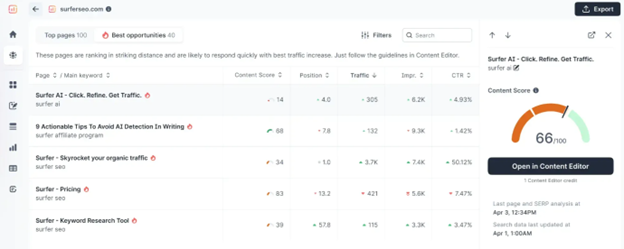
Source: Surferseo.com
Surfer SEO is a relatively new tool developed in 2017 by a team of SEO fanatics from Poland. It quickly became a truly iconic, popular product for SEO globally.
It is a versatile tool that is equally brilliant and easy to use for content creation and preceding research. In content research, Surfer SEO shines in the following domains:
- Searching for keywords and keyword combinations. Enter your main query in the Content Editor inside Surfer SEO — this will give you a whole ocean of related search queries, as well as information on their popularity.
- Probing the competitors. Surfer SEO will quickly find and analyze your direct competitors with a high content score. If you are not satisfied with its choice, you can always add or exclude pages manually. With Surfer SEO, everything is under control!
Prices start at $79 per month, which is less than the direct competitors ask for. At the same time, there is no fixed upper pricing limit when customers choose a custom subscription.
Pros:
- Data-driven insights utilizing real-time SERP data;
- Precise optimization suggestions that enhance content competitiveness;
- Utilization of AI to predict content rating and keyword configurations;
- Vast versatility (equally suitable for content creation and research, for blogs, social media, and e-commerce pages);
- Integration with other content-creation platforms to enhance SEO efficiency;
- High customization with a custom subscription.
Cons:
- Pricey, especially for small businesses and freelancers;
- On-page SEO one-sidedness (overly relies on on-page content optimization rather than backlink research, i.e., off-page SEO is a weak spot).
Surfer SEO provides remarkable customization opportunities at a reasonable cost. It’s a great SEO content writing tool for everyday SEO needs, featuring AI capabilities not seen in direct competitors.
Powerful SEO content writing software: content creation made easy
The making of SEO-optimized content is no less, if not more, time-consuming than research. Besides and before writing itself, it requires careful planning and ideation — both highly intelligence-intense tasks.
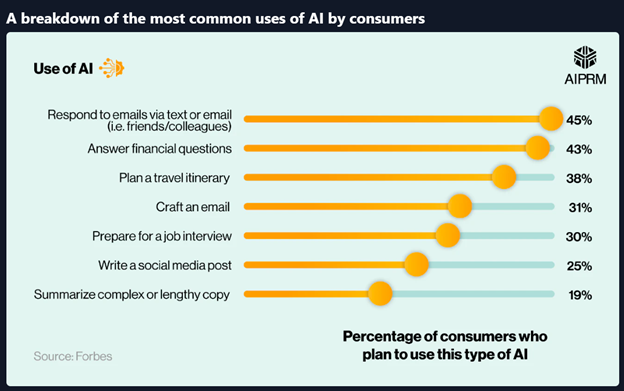
Source: aiprm.com
Many believe that, at least today, humans can do ideation (some love to call it “strategizing”) much better than artificial intelligence (AI) can, particularly the Large Language Models (LLMs) that use natural language input and output to communicate with us.
While the above is hard to argue against, a combination of a human mind and an AI assistant can do even better in the content writing ideation domain. AI tools like ChatGPT and Gemini can do the following for us:
- Help with topic choice;
- Suggest structure ideas;
- Help draft a content outline;
- Write content from scratch;
- Check and edit grammar and word choice.
Most modern SEO tools for content writing have embedded AI functionality to help us plan, write, and edit content. Nevertheless, we can still distinguish between more or less “pure” AI writing assistants (LLMs) and tools that mix content writing/editing and AI assistance.
Let us start with the “pure” LLMs like ChatGPT, Gemini, and Claude, which are the most potent AI tools for SEO content creation for the time being.
ChatGPT
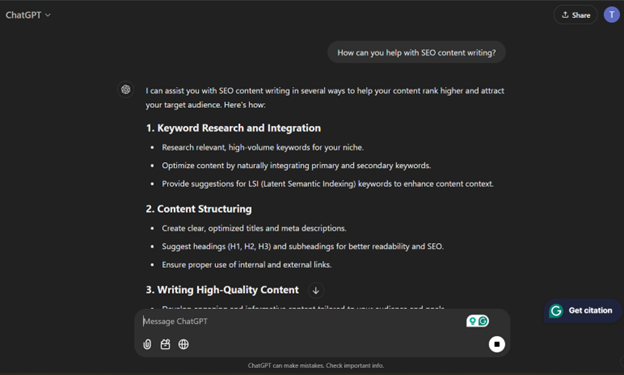
Source: Chatgpt.com
Who hasn’t heard of ChatGPT? The whole AI hype kicked off with it in 2022. Nevertheless, our list of LLMs would be incomplete without reviewing what it can do, particularly for SEO content writing. And in content writing, it shines, indeed.
GPT stands for Generative Pre-trained Transformer, meaning it generates and transforms the existing online knowledge and information to address user-specified queries.
In connection to SEO and writing SEO-driven content, ChatGPT can do many things, including;
- Writing articles, blog posts, landing pages, case studies, and other marketing copy;
- Help with ideation: come up with a topic, structure, focus points, etc.;
- Correct and edit writing: typos, grammar, flow, etc.;
- Paraphrase and suggest synonyms;
- Lengthen or shorten content.
Every year, ChatGPT becomes exponentially more powerful, as the dedicated AI compute it receives is growing by a factor of 10x every 6 months. Who knows what it will do at the end of 2025? However, already today, its capabilities are astounding.
Pros:
- Easy to use: intuitive interface, fantastic speed;
- Frequent updates (current GPT-4 is 10x more capable than GPT-3.5);
- High versatility: multilingual support and various tones of voice and styles available;
- SEO keyword integration capability with relevant prompts;
- Cost-effective: the free version is highly potent for most writing tasks.
Cons:
- Lack of originality (same as with most LLMs);
- SEO keyword inefficiencies (may overstuff with keywords or use improperly);
- Human quality control is required;
- Privacy concerns (sharing corporate info might pose confidentiality risks).
As a free SEO writing assistant, ChatGPT can do many things. However, thoughtful human oversight and a critical review and proofreading of the results are essential for the best output.
Gemini
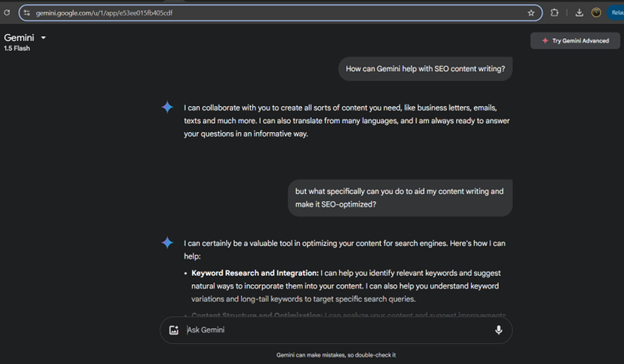
Source: Gemini.google.com
Gemini is a Google’s creation. It’s also an LLM capable of generating and transforming the world’s knowledge for the needs of SEO writing.
One of its undeniable advantages as an SEO content writer tool is integration with the Google ecosystem for streamlined workflow. For instance, it seamlessly integrates with Google Search Console to help you optimize keyword usage and match it with user intent.
Gemini also blends with Google Analytics and Google Workspace. The latter stipulates integration with Docs, Sheets, and Slides for better writing process organization. In practice, you can access Gemini AI-writing abilities right from your Google Docs space.
Pros:
- Seamless integration with Google ecosystem;
- Advanced content writing and optimization (in part thanks to sync with Google Search);
- Global reach, useful for regional SEO (building on Google’s global presence);
- Content optimized to the competitive landscape;
- Cost-effective (the free version is highly potent for most writing tasks).
Cons:
- Dependency on Google’s ecosystem (results might overly rely on Google’s policies and search algorithms);
- Lack of originality, imposing creativity constraints;
- Privacy concerns (sharing corporate info might pose confidentiality risks);
- Human quality control is always required.
Google never stops developing and improving its Gemini. The newest Flash 2.0 Experimental version is on the roll, allowing users to test and experiment with the advanced AI LLM from Google.
Claude
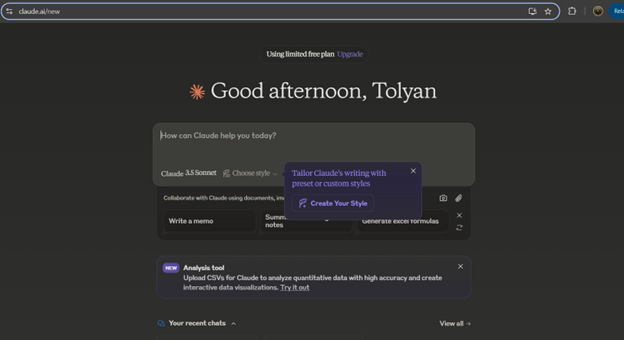
Source: Claude.ai
Claude by Anthropic is undoubtedly one of the most capable free content writing tools for SEO experts. It provides full-cycle SEO content creation, from content planning and structure through content creation, optimization, and quality assessment.
This LLM packs many useful features for content creators, including the choice of pre-defined writing styles and the possibility to create your own custom style based on personal preferences and needs.

Source: Claude.ai
Pros:
- Can adapt writing style to match the user’s brand tone of voice;
- Trained on SEO best practices;
- Versatility (capable of social media posts, articles, blogs, and product descriptions);
- Cost-effective (the free version is highly potent for most writing tasks).
Cons:
- Limited access to real-time SEO data, e.g., competitor metrics & keywords;
- Cannot measure content performance in real-time (same limitation as with most other LLMs);
- Lack of originality, requiring “human touch” to bypass AI detectors;
- Privacy concerns (sharing corporate info might pose confidentiality risks);
- Human quality control with prompts and quality assurance is necessary.
The model doesn’t stand still. For example, the newly released Analysis tool allows users to upload a CSV file with data, and Claude will analyze it and present findings as plain text or as graphs, charts, and tables.
Some precautions on using LLMs in SEO
LLMs are great for generating large volumes of content and automating routine SEO-related tasks. However, to be called the best content writing tool for SEO, any of the contemporary LLMs lacks something critically important — originality. For that token, they cannot pass AI detectors.
This is a serious problem since search engines like Google, Bing, and Yahoo prioritize original, human-made content and penalize content created by language models, even the most capable ones like Gemini, ChatGPT, and Claude.
Another sign of caution is that no LLM can give you 100% accurate information. Trust in them is not high, as seen in the last presidential elections in the US, where only four out of ten American adults trusted the election information that came from ChatGPT.
LLMs only give generalized answers based on the information available online (which we sometimes call “garbage”).
Moreover, these models are known to “hallucinate,” i.e., provide incorrect answers, which they make up. So, critical thinking is the most valuable skill you will need to work with LLMs for your SEO content writing tasks.
General-purpose content writing tools for SEO
Calling our next portion of the best SEO content writing tools as a general purpose type is for a reason. Unlike specialized research tools like Ahrefs and SEMrush and “pure” AI generators like ChatGPT and Gemini, these are meant to aid humans as we write ourselves.
They pack the following features:
- Writing assistants;
- Ability to select writing styles and templates;
- Grammar and language checking;
- Integration with popular writing platforms (e.g., MS Office, Google Docs, etc.).
Almost all of them also come with AI-embedded assistants, suggesting the most logical sentence and word flow (much like the predictive text in regular word-processing applications).
Beware of these embedded AI assistants, as they are a double-edged sword in SEO.
On the one side, they help with writing, making it significantly easier. On the other side, they make your text “inhuman” and less SEO-friendly, turning it into an easy “prey” for AI detectors.
So, don’t over-rely on these assistants, accepting everything they suggest, and you’ll be fine when dealing with AI detectors.
Frase
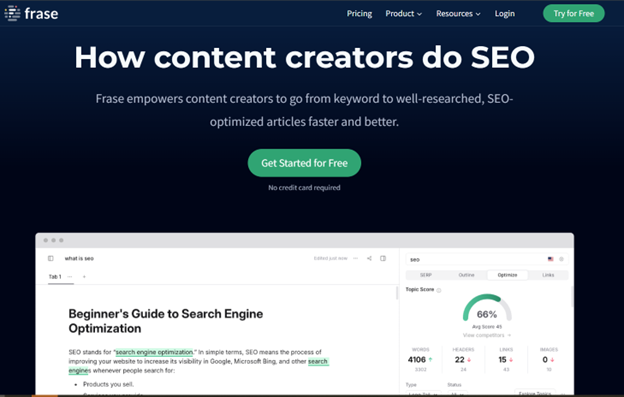
Source: Frase.io
We start our review of the best SEO writing tools, laying claim to versatility, with Frase because it’s an all-in-one tool. It marries SEO research with AI-assisted writing and editing. In the Frase case, all these features are balanced and complement each other nicely.
With Frase, you can effortlessly transition from keywords to well-researched SEO articles. The tool will analyze the top-performing content and relevant SERP websites for a given keyword and then assist you with finding topics, creating titles, making outlines, writing copy, and proofreading as a final touch.
Frase is remarkably easy to use. The developers call it “a repeatable content creation process” that doesn’t require much effort to learn and master. We call it simpler — addiction, as we are used to calling a spade a space.
Among all SEO content writing tools free of charge, Frase is not the best option, so to speak. While the free functionality is tempting to try (no credit card required), it is limited to only one SEO document and 2,500 AI words.
The real SEO writing “power” starts at $45 a month, while the maximum deal costs as much as $115.
Pros:
- All-in-one tool for SEO content creation;
- Handy SEO research, including keyword and competitor analysis;
- Easy to use;
- Efficient content creation: from ideation to optimization;
- Improved efficiency with AI.
Cons:
- Not a very functional free-trial version;
- AI dependency risks;
- Limited grammar-checking functionality.
Frase is a great tool for beginner SEO specialists, as it is easy to use and doesn’t cost a fortune to try the advanced functionality. At the same time, it packs some decent SEO research and optimization power and can make you forget to try other tools, at least until you come across Notion.
Notion

Source: Notion.com
To say Notion is an SEO blog writing tool or a general-purpose SEO tool is to say nothing. This is a true content-creation and collaboration ecosystem, a workspace to write, plan, and cooperate with your team members.
To aid the writing process, Notion offers over 30,000 different templates! SEO fanatics can find everything they need here, including templates for blog posts, articles, emails, social media posts, landing pages, product listings, and more.
We call Notion a workspace for a reason — it offers vast integration possibilities with all leading writing, planning, and editing platforms for productive work online. These include but are not limited to Google Docs, Workflowy, Dropbox Paper, Asana, Quip, Slack, Word, Evernote, etc.
There is a decent free plan available. It makes Notion a capable SEO writing assistant free of charge. However, for serious SEO content making, you should consider one of its paid plans: Plus ($10 per month), Business ($15), and Enterprise (custom price based on selected features).
Pros:
- All-in-one platform for SEO content creation;
- Customizable setup, including templates, content calendars, and outlines;
- Diverse collaboration and integration features;
- Knowledge repository (own Wiki database);
- Built-in AI assistant.
Cons:
- The built-in AI assistant may disturb SEO quality;
- Steep learning curve due to the myriad of features and settings;
- Offline access limitations;
- Complicated direct publishing (poor integration with WordPress).
All in all, Notion is a capable platform for SEO content-makers looking for versatile SEO article writing tools with many practical features onboard. At the same time, it is highly dependent on online access, requires significant efforts to master its broad features, and has next to zero SEO-research functionality.
QuillBot
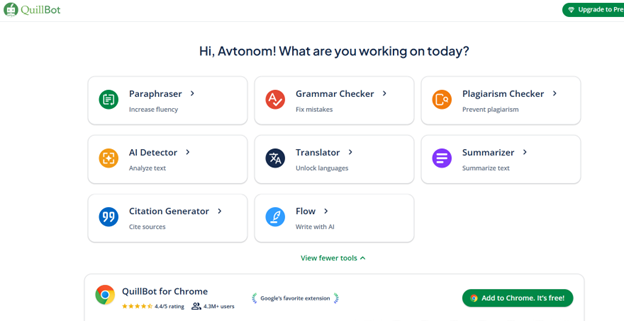
Source: Quillbot.com
What’s the biggest plague today in SEO content writing? It’s duplicate and AI-generated content. QuillBot helps to detect duplicate and AI-generated content in the blink of an eye.
Moreover, among all SEO blog writing tools, QuillBot stands out as an effective paraphrasing solution. By changing the tone of voice and writing styles, users can bypass AI and plagiarism detection.
Other handy features include a citation generator for serious research work, a translator for global SEO reach, a grammar checker, a summarizer, and a flow corrector.
The free plan is worth trying. It gives you plenty of useful features like paraphrasing, fixing basic grammar (in texts up to 1000 words long), generating texts, making summaries, proofreading, and using AI-detector (up to 1,200 words in a single text).
The paid version won’t cost you a fortune, either — only $4.17 per month.
Pros:
- Efficient paraphrasing tool;
- Multiple writing styles available, e.g., concise, creative, formal;
- Powerful grammar and spelling checks, even in the free version;
- Cost-effective;
- User-friendly interface.
Cons:
- Lacks advanced SEO tools (keyword analysis and placement, SERP analysis and insights, competitor checks);
- No integration with CMS platforms like Google Docs and WordPress.
Among all content writing tools for SEO, QuillBot will be ideal for updating outdated content scenarios (e.g., for better ranking), optimizing content for readability, and avoiding plagiarism and AI detection.
Conclusion
SEO has set the content-writing quality bar very high. Human skills and experience are no longer sufficient to be competitive and make content that repeatedly ranks high in SERPs.
Today, it is the combination of humans and machines that rules in SEO content writing. Various SEO tools for content writing are being widely deployed to assist humans with researching and making search engine-friendly content.
In this article, we’ve reviewed some of the best SEO content writing and research tools. It seems logical to divide them into three large categories:
- Tools for SEO research (e.g., Ahrefs, SEMrush, Surfer SEO);
- SEO content writing software based on GPTs or LLMs (e.g., ChatGPT, Gemini, Claude);
- General-purpose tools for SEO content making (Frase, Notion, QuillBot).
Nevertheless, the line between these three categories becomes increasingly blurred as they all surrender to the AI onset (integrating AI writing and research assistants) and lay claim to versatility by combining research, writing, and editing in one package.
The choice of which tool to try first is always yours. However, the ocean of SEO content writing tools is bottomless, and we’ve barely scratched the surface with our nine tools reviewed in this article.
Go SEO diver and discover its depth further, guided by some of the principles and precautions we gave you today.
Enter URL & See What We Can Do Submit the form to get a detailed report, based on the comprehensive seo analysis.





